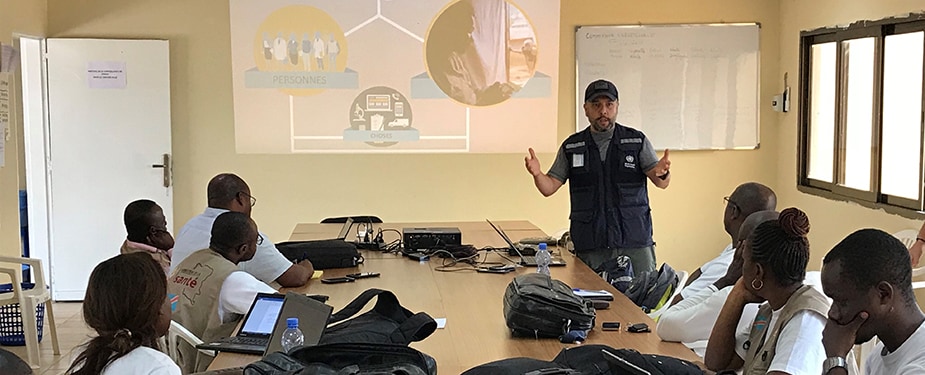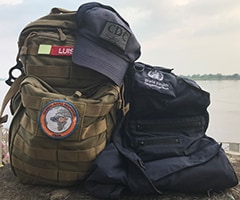One Responder’s Call to Action: Fighting Ebola in DRC
September 6, 2018

CDC Emergency Management Specialist Luis Hernandez conducts IMS and EOC training for organizations involved with the 2018 DRC Ebola response.

Luis Hernandez's gear in front of the Congo River.
Luis Hernandez stuffed a large suitcase with camping gear. Among other things, the bag carried multiple flashlights, waterproof clothes, and other items that make sense for a tour of undetermined length in a remote area of the Democratic Republic of the Congo (DRC).
Despite the hard conditions, Hernandez was ready. The World Health Organization’s (WHO) Department of Emergency Operations (DEO) requested him by name to help fight the May 2018 Ebola outbreak in the Bikoro area of Equateur Province in Northwest DRC.
As an Emergency Management Specialist at CDC, Hernandez understands what it takes to coordinate an efficient and effective response directed by an emergency operations center (EOC). WHO needed Hernandez and his skills to manage an EOC that had been set up to serve the three regions in where the outbreak took place. Hernandez was an advisor to WHO’s Global Outbreak Alert and Response Network (GOARN). GOARN ensures that the right technical expertise and skills are on the ground and available during outbreaks.
EXPECTING THE UNEXPECTED
As an outbreak response veteran, Henandez knows that the only “expected” is the “unexpected.” That was true this time when his destination changed from a tent to be a hotel room in Mbandaka.
The second thing he did not expect is that he would immediately take over as the WHO EOC lead. Upon his arrival, he found himself at the helm of a makeshift facility that had been set up to control the outbreak. “We had just three flat-screen monitors and a couple of donated laptops from WHO,” he says. “There were a few tables and plastic chairs, no phones, and nine empty, non-air-conditioned rooms where the various teams and commissions working on the response could gather.”
A flurry of activity was already taking place in the region: disease detectives in the field conducting contact tracing; teams racing to outpace the spread of the virus with vaccines; screeners checking the health of people moving in boats along the Congo River. Experts from organizations across the globe — WHO, Medecins Sans Frontieres (MSF), Red Cross, the Alliance for International Medical Action (ALIMA), the United Nations Office for the Coordination of Humanitarian Affairs (OCHA), and the United Nations Children’s Fund (UNICEF) — all brought critical knowledge and skills to help eliminate the outbreak.
“The most important thing in any emergency is having skilled responders who know what to do.”
Luis Hernandez
CDC Emergency Management Specialist
His mission, however, did not change. Hernandez job was to bring all the local and international partners on the ground supporting the response into the EOC and give them tools to share information and make correct, timely decisions. Everyone needed to stay aware of all aspects of the response by informing each other and the Ministry of Health (MOH) daily.
With support from the United Nations Peacekeeping Mission, Hernandez worked to establish basic systems, setting up generators and internet access. He also improved safety and security in the EOC, including getting urgently needed supplies like fire extinguishers. “We had a short circuit and almost burned the generator,” he says.
A SYSTEM FOR THE FUTURE
He also began teaching responders how to create and apply an Incident Management System (IMS), which they can use to manage future emergencies. In a crisis, an IMS offers a set structure that outlines the specific roles and responsibilities of responders. Hernandez knew that an IMS could provide a common framework for the many partners fighting the outbreak to work seamlessly together.
“The advantage of using an IMS is that it brings all the different commissions together and also ties in operations aspects like finance, planning, operations, and logistics. It brings people out of their silos,” says Hernandez.
The EOC offered a way to manage the many resources and people involved and, ultimately, played an important role in eliminating the outbreak. And now, with a new Ebola outbreak in DRC’s province of Nord-Kivu in Eastern DRC, the “muscle memory” left behind as a result of the work Hernandez and others did will help.
Especially in the most remote areas of the world, having people who understand how to coordinate a response is key to saving lives. After all, Hernandez always says, “The most important thing in any emergency is having skilled responders who know what to do.”
RAPID ACTION SAVES LIVES
The Ebola outbreak in DRC posed a grave threat, demanding rapid action from many partners to contain it. The WHO declared an end to the outbreak on July 24th, 2018. The outbreak resulted in 54 cases (38 cases laboratory confirmed and 16 deemed probable) and 33 deaths.

Support vehicles assisting with Ebola outbreak response in Northwest DRC.